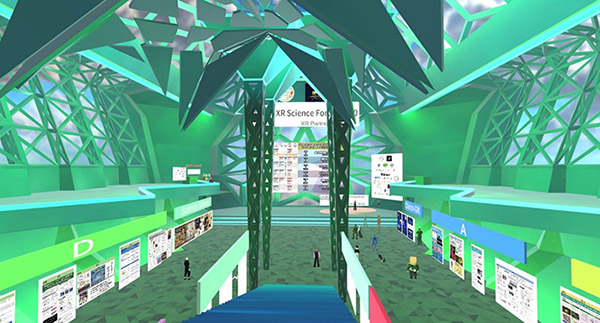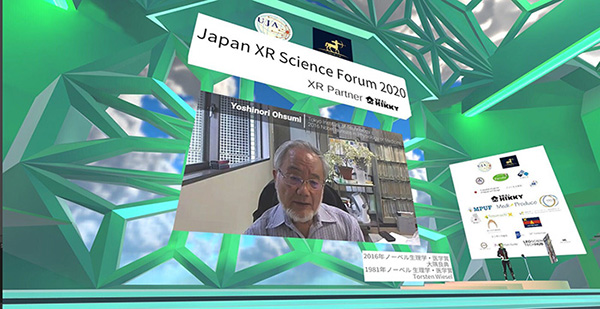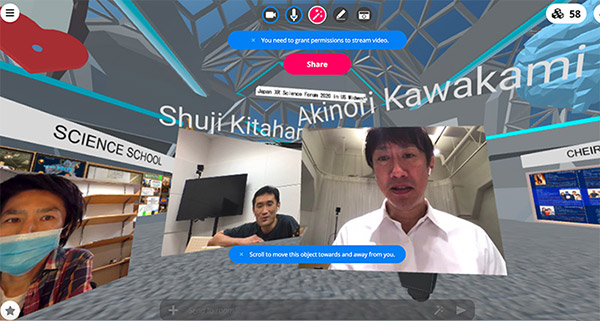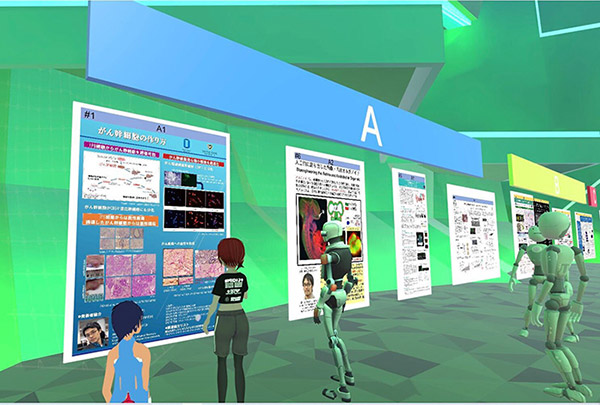News
Academic Meetings in VR Space: Releasing Physical and Mental Constraints in the Face of the Pandemic Updated in July 2021
"Japan XR Science Forum 2020 in US Midwest"─A unique academic meeting using virtual reality (VR) technology was held in July 2020.
The event was co-hosted by United Japanese Researchers Around the World (UAJ President: Sasaki Atsuo), an organization that supports overseas Japanese researchers, and the NPO Cheiron Initiative, which supports families of overseas these researchers (Chairperson: Adachi Haruna). More than 1,000 people participated in this half-day gathering which lasted five hours, from 7:00am to 12:00pm on Sunday, July 12 (Japan time). Participants listened to and interacted with each other while moving around a virtual conference venue using avatars.
Due to COVID-19, academic meetings are going online in many places. Online conferencing tools are becoming more common in the scientific community. However, academic meetings in virtual space using VR technology make online gatherings more fulfilling, not only because of the ease of participating from a computer screen, but also because of the realistic sense of sharing a space and encountering others through "chats" at the venue. Japanese researchers abroad and their families are leading these novel attempts, making new efforts to release physical and mental limitations during the pandemic.

COVID-19 Prompted Renewal of Academic Meeting Scheduled in Chicago
The "Midwest Conference," is a series of regularly held academic meetings where Japanese researchers and families from the Midwestern United States gather and interact. In 2020, it was scheduled to be held at the Consulate-General of Japan in Chicago.
However, due to the spread of the new coronavirus, organizers were urged to reexamine ways to host the meeting. There was the option to cancel or postpone, but the host team worked together and took a big step toward tackling this new challenge. They decided to set up a venue in a virtual space resembling reality, and to invite participants from all over the world.
UAJ and the Cheiron Initiative connected various academic meetings revolving around Japanese researchers and turned the gatherings into a global exchange platform, naming it the "Japan X Science Forum Series". In an attempt to develop into a base for global exchange, it was hosted as "Japan XR Science Forum 2020 in US Midwest."
According to Dr. Takata Nozomu (Secretariat of the Northwestern University Japanese Researcher Association - NUJRA), who served as the chairperson of this conference, this conference serves as a proposal for innovation in science forums in the “With-COVID-19” era. The <Japan X Science Forum> series is a forum created by Japanese researchers living around Boston and the Midwest (United States) and by members of UAJ.
Its origins go back to the <2016 Japan-US Science Forum> held at Harvard University in Boston, and the <Midwest Conference> held in Cincinnati.
With the vision of "Changing the World through Japan's Scientific Endeavors", the group tries to indicate the academic advancement of Japanese researchers in the United States, despite their decreasing numbers. Furthermore, the group aims to raise the presence of Japan’s STIs (science, technology & innovation) in the world. Members from a variety of fields have come together to develop this science forum. This movement will be expanded to Europe and China.
Both Plenary and Parallel Sessions Were Effectively Structured
At this academic meeting, many ideas bloomed into well-designed sessions. Like a regular science forum, it consisted of a plenary session where all participants gathered, and parallel sessions where discussions were divided by theme. In addition, between the specialized discussions a science class was held for parents and children, allowing the forum to welcome participation from the scientists’ whole family.
There were two plenary sessions: the opening session (40 minutes) and the closing session (30 minutes). The opening session featured greetings from guests and organizers, as well as the award ceremony <Researchers’ Study Abroad Family Support Initiative: Cheiron-GIFTS 2020>. This award is for families traveling overseas with Japanese researchers.
The closing session consisted of an award ceremony acknowledging good presenters from the parallel session who received high votes, a presentation by Ohsumi Yoshinori (2016 Nobel Prize in Physiology or Medicine), video messages from guests, and so forth. This plenary session took place entirely in virtual space.

Firstly, a three-dimensional venue is set up in virtual space. You can log in from your computer through an online platform for experiencing virtual spaces─VR Chat (for Windows) and Hubs (both Windows and Mac). At this time, you can select your own avatar which will represent you in virtual space. That avatar can move freely inside the venue.
The etymology of the word "avatar" seems to come from Sanskrit, and means “incarnation of a god.” You can navigate your incarnation and talk to people you meet at the venue.
The present author also used this system to look around the venue. During that time, I was able to meet Dr. Kitahara Shuji (Director of UAJ and Associate Professor at Tokyo Women's Medical University). I was then introduced to Dr. Kawakami Akinori (Clerk of UAJ, Harvard Medical School, Lecturer at Massachusetts General Hospital). This is a common experience in ordinary academic meetings.
Although we participated by controlling our avatars, when we met on- screen we were able to talk while looking at each other's real faces. "Ah, Shimada-san, thank you for your participation. I would like to introduce Kawakami-san from Boston. Hmmm, where did he go? Ah, Kawakami-san, here! Here!" "Nice to meet you, hello." It's hard to explain in text, but this is how the conversation went.

Between the opening and closing sessions, there were 80-minute parallel sessions on "Cells X Latest Research", "Interdisciplinary Exchange X Careers After Studying Abroad", "Study Abroad Recommendations X Japan XR Science Forum", "Immune/allergy X Skin", and "Interdisciplinary Fusion X HFSP (International Human Frontier Science Program)" . These sessions were conducted through Zoom.
There were various themes─research topics, study abroad topics, and cross-disciplinary exchange topics. At the same time as the parallel sessions, a poster session was held at the plenary session venue, and a tour around the posters was planned.

Lots of projects were effectively placed in the 5-hour program, and I never had to worry about where to look. This was the first attempt to utilize virtual space, so preparations must have been difficult, but the structure was really well thought-out.
The plenary and parallel sessions were broadcast on YouTube so that people could attend the virtual conference without logging into VR Chat or Hubs. Those who were new to software setup could join from here. It was a well-developed platform that could accommodate various forms of participation.
The Willpower and sense of urgency among Japanese researchers
Holding the meeting in virtual space─not just through online conference software─was a new and challenging undertaking. From the efforts of Japanese researchers who planned and executed the conference, we were able to see that Japanese researchers abroad and their families were supporting each other in order to connect people and nations, and to eventually change society.
The co-host of this forum, the Cheiron Initiative, supports Japanese researchers and their families. This year's theme for the newly launched subsidy system focuses on "overseas career path issues for researchers' families." The number of family members accompanying Japanese researchers may be as high as 2 million. Not only will researchers who venture out into the world play an active role, but their spouses, children, and families—including aging parents who need care—also deserve to have a fulfilling life. This is the message behind this award.
Takata Chiaki, who won the grand prize, was a nurse in Japan, but left her job and moved to the United States with her spouse. She said she wanted to help as much as she was able, and decided to get certified as a nursing assistant in the United States.
In this way, new career paths are formed. When Japanese researchers leave for the outside world, opportunities for collaboration are not limited to the lab. Families are also valuable "ambassadors". Supporters sympathized with the message emphasizing the need to be close to the lives of researchers’ families, too.
Nobel laureate Ohsumi Yoshinori, who sent a video message, said, "The world is currently turning inwards due to the pandemic, but I want young people to go abroad and come into direct contact with different cultures. You only live once. The spirit of taking on challenges is important.” He concluded, “A safety net is also necessary, and activities by UAJ and the Cheiron Initiative to support overseas researchers and their families are gearing up like never before, and I hope for more initiatives like this.”
In order to spread the spirit of challenge in society, we need a base to support new challenges. It conveys the strong willpower and sense of urgency on the part of researchers who have voluntarily created such a base from grassroots efforts. We are deeply indebted to these attempts.
This challenge to conduct an academic meeting in virtual space was made possible through collaboration with HIKKY, a VR corporation (Shibuya-ku, Tokyo). HIKKY has a vision to "unleash human creativity from existing values." Can we turn the crisis caused by COVID-19 to an opportunity to release ourselves from preconceived ideas? Seeing researchers and partnering companies working together, I wanted to have that kind of positive spirit, too.








